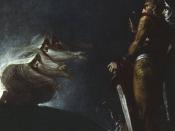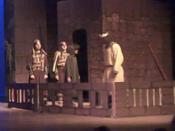Macbeth's asides show s great deal about his character. His first aside - beginning "if twere done" proves his rationality, his sensibility. He knows that what he is doing is wrong, and not without consequences; however, his ambition is so strong that is overrules all his other, good characteristics. Macbeth's ability to weigh the pros and cons of a matter, as well as to view matters from many points of views is shown here as well. He looks at the murder from a religious perspective, then from that of a kinsman and subject, and then of that of a host. His loyalty to Duncan is also obvious in his first soliloquy; he knows what a good king Duncan is and is not prepared to murder him (at that point) for just his own "vaulting ambition".
In the second aside (dagger), Macbeth's extreme guilt and paranoia are shown.
He feels guilty about what he is doing; however at this point his ambition has become so strong, that it overlaps all other emotions. Here Macbeth also seems unable to distinguish between reality and illusion. In his previous soliloquy, Macbeth had been sure that since Duncan was such a "good" king, he would go to heaven. However at the end of this aside Macbeth says "to heaven or to hell". Now he is not even sure whether Duncan is bound for heaven or hell, making this murder seem all the more cruel.
The third soliloquy makes Macbeth's paranoia and mistrust obvious. He no longer trusts even Banquo, and fears his "loyalty of nature". It is interesting to note here that he is even more in fear of Banquo than he is of Duncan's sons. In inability to trust becomes his weakness, as we know that Banquo had no plans for himself. Ironically, it is because Macbeth has put so much trust in the witches that he commits all his actions.
Again, his prime weakness: his ambition is so very obvious here that even though he has no sons, he wishes to father a line of kings, and does not want the 'fruits' of his efforts to go to someone else's family. His awareness of the consequences of his actions is also shown here - he says he has put rancours in his vessel of peace for someone else. This may be considered a strength, but is greatly underplayed due to his ruthless ambition. By the time we reach his fourth aside, which he speaks after he is informed of his wife's death, he has become cold and indifferent. He does not show any sorrow at the news of his wife's death, once his "partner in greatness". It is this same ruthlessness that overcomes him after he has got the crown - that causes him to murder Macduff's family, and that ultimately leads to his downfall.





